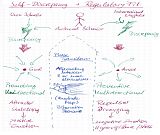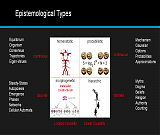Psychology
-
Why is Epistemology So Difficult To Grasp?
 What are Epistemological Assumptions?
What are Epistemological Assumptions?
A way of thinking … yes, but not only that.
A mindset … yes, but not only that.
An attitude … a complete set, but not only that.
A worldview … yes, but not only that …Read more about my funny journey towards discrete-looped phenomena.
Posted , Author Dana Stoll
-
Self-Discrepancy and Regulatory Fit: Attractor & Repulsor
 The first theory to dismantle with the help of patterns of chaos science is E. Tory Higgins’ theory of self-discrepancy and regulatory fit. The theory is described in detail in Higgins (1987, 1997, 2000). The following figure shows a simplified, systematic overview over the theory. Both dynamics of Higgins’ preventive and preventive behaviour can be modelled as attractors or repulsors. They are extremes on a discrete-looped spectrum of phase transitions …
The first theory to dismantle with the help of patterns of chaos science is E. Tory Higgins’ theory of self-discrepancy and regulatory fit. The theory is described in detail in Higgins (1987, 1997, 2000). The following figure shows a simplified, systematic overview over the theory. Both dynamics of Higgins’ preventive and preventive behaviour can be modelled as attractors or repulsors. They are extremes on a discrete-looped spectrum of phase transitions …Posted , Author Dana Stoll
-
Chaos Psychology - Introduction
 Psychological phenomena, to great certainty, emerge from the underlying biology of the brain. The brain is a vastly complex, looped network with many levels of internal closure and external open and closed loops. Therefore, any psychological phenomenon is likely to show the properties of emergent phenomena. It is thus necessary to examine psychological theories regarding their epistemological assumptions, whether they base on category/hierarchy (linear-discrete), probabilistic (linear-continuous), homeostatic (looped-continuous), and morphogenetic (looped-discrete). The following slide illustrates the concept:
Psychological phenomena, to great certainty, emerge from the underlying biology of the brain. The brain is a vastly complex, looped network with many levels of internal closure and external open and closed loops. Therefore, any psychological phenomenon is likely to show the properties of emergent phenomena. It is thus necessary to examine psychological theories regarding their epistemological assumptions, whether they base on category/hierarchy (linear-discrete), probabilistic (linear-continuous), homeostatic (looped-continuous), and morphogenetic (looped-discrete). The following slide illustrates the concept:Posted , Author Dana Stoll
← Older Newer →